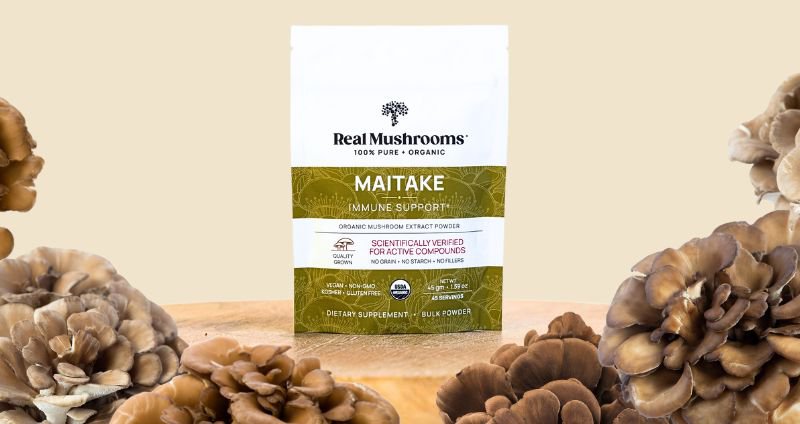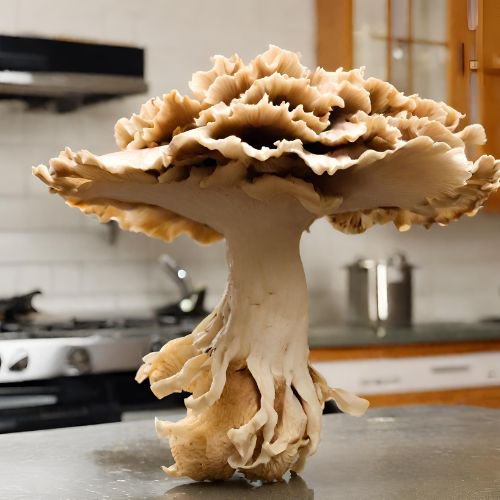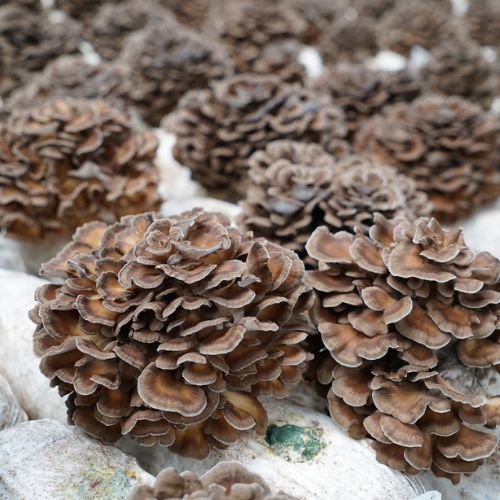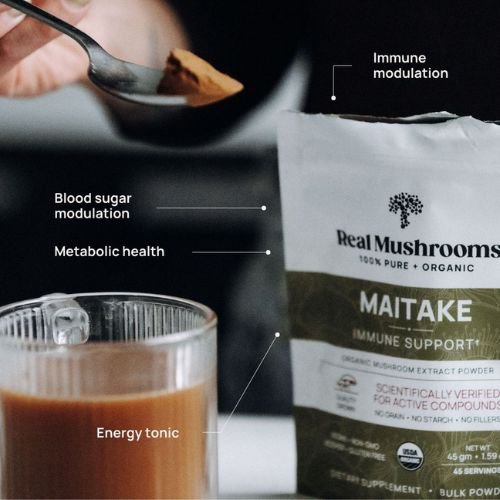Menu


As the temperatures cool down in late summer and early fall, those chilly mornings mean one thing for mushroom fans: maitake mushrooms are coming.
The humble-looking maitake mushroom is often called “Hen of the Woods” because it resembles the grey or brown ruffled feathers of the tail-end of hens. But don’t be deceived by its unassuming appearance! This mushroom packs a punch where its health benefits are concerned.
Maitake can be used as a functional health support, and it’s also a delicious culinary mushroom. Its versatility and taste are why they are prized by foragers and natural health aficionados alike.
In this guide, we’ll explore the science-backed health benefits of maitake and what makes them so valuable. By the end of the guide, you’ll understand why this fascinating mushroom has been cherished for centuries.
Grifola frondosa, better known as maitake, is a Basidiomycetes fungus that is commonly found around the stumps of trees, particularly oak trees, in temperate forests of eastern North America, Europe, and Asia.
Maitake is the Japanese term for “dancing mushroom” (mai means dance, take means mushroom). According to legend, finding maitake mushrooms would spark such joy in people that they would dance (1). Maitake was also once used as currency during Japan’s feudal era. So prized were maitake that they could be exchanged for the same weight of silver (1). It likely helped that some maitake can grow very large — up to 100 pounds (2)!
In other parts of the world, G. frondosa goes by the following names, depending on the region:
Maitake was a culinary favorite in Asia for centuries. Even today, many worldwide enjoy maitake’s meaty yet deep, earthy flavor in various dishes.
To the ancient Chinese and Japanese, maitake was more than a delicious food. Traditional Chinese medicine practitioners used maitake as a medicinal mushroom. They put maitake in a remedy called “keisho,” which was used to treat hemorrhoids, improve spleen and stomach ailments, and support skin health (3).

Before we get into the health benefits of maitake, it’s important to recognize why maitake has been cherished for so long by both chefs and herbalists.
Mushrooms are known as “vegetable meat” in many cultures (4). The reason for this is simple: mushrooms are naturally dense and chewy and have a natural umami flavor making them some of the best meat substitutes for just about any dish.
Even among other culinary mushrooms, maitake is one of the most nutrient-dense.
If you want inspiration for how to cook up maitake to take advantage of it as a delicious and nutritious meat substitute, here’s a recipe we recommend:
In addition to being good sources of nutrients, many mushrooms are considered nutraceuticals.
The term “nutraceutical” is derived from “nutrition” and “pharmaceutical.” Although there is no universally accepted definition of the term, it is often used to describe a substance that has physiological benefits or provides positive health benefits. Nutraceuticals can be either whole food or its part, or even a single component of a food.
So how do maitake mushrooms fit into the picture?
Over the last 30 years, more than 47 bioactive polysaccharides have been isolated from maitake (6). However, a discussion about maitake would be incomplete without spotlighting a Japanese professor named Dr. Hiroaki Nanba and perhaps the most notable of maitake polysaccharides, D-fraction and MD-fraction.
In the 1980s, a team of scientists led by Dr. Nanba isolated various beta-glucan fractions, which they noted had a unique structure that has both (1,3) and (1,6) branching. Other mushroom-derived beta-glucans only contain (1,6) branches (6).
Among the various beta-glucan fractions isolated, one stood out for its therapeutic potential: D-fraction. This alkali-soluble, hot water extractable compound contains a beta-glucan to protein ratio of 7:3 and a high molecular weight of 1 million Daltons. The molecular weight is thought to be responsible for its strong immunomodulatory potential. In early animal studies, D-fraction demonstrated its ability to increase the activity of natural killer cells and T-cells by 1.5 to 2.2 times (1).
D-fraction was later further purified to a version known as MD-fraction.
Although other maitake polysaccharides have been identified, much of maitake research to date has been focused on D-fraction and MD-fraction.
Traditional Chinese and Japanese medicine practitioners have used maitake for millennia to enhance the immune system. Conventional medicine is beginning to recognize the numerous ways maitake could support health and wellness.
Continue reading for an overview of the most scientifically supported health benefits of this versatile mushroom.

Maitake is perhaps best known for its immunomodulating properties, largely due to its polysaccharides. Immunomodulating activities by maitake polysaccharide fractions include activation of immune cells, such as lymphocytes, macrophages, and natural killer (NK) cells, and stimulating the production of various cytokines and chemokines like interleukin (IL) 12 and tumor necrosis factors (TNF) (7,8).
Maitake’s ability to activate various immunocompetent cells may be of particular interest to people undergoing immunosuppressive therapy. A study conducted by Kodama and colleagues reported that D-fraction could help reduce the effective dosage of mitomycin-C in animals, a chemotherapeutic agent. The results suggest that increases in the proliferation, differentiation, and activation of immunocompetent cells were the major contributing factors (9).
Human clinical trials are beginning to show similar immunomodulating benefits of maitake. In a small phase I/II study conducted by the Memorial Sloan-Kettering Cancer Center, maitake demonstrated the ability to stimulate the immune system in patients (10). However, the investigators also found that maitake depressed certain immunologic parameters, suggesting much more research is needed.
A strong immune system may also help your body fight off pathogens. Maitake D-fraction has been studied in combination with vancomycin for the treatment of Listeria monocytogenes, the species responsible for listeria. In the study, mice who received the combined therapy of D-fraction and vancomycin showed an increased survival rate (60% on the 10th day after inoculation with L. monocytogenes), while non-treated mice died just 3 days after inoculation. The investigators also found that the treated mice produced 2.7 times as much IL-1 as the control mice, and the bactericidal activity of their T-cells was also 2.6 times higher (11). These findings suggest a potential role for maitake in treating certain pathogens in high-risk patient groups.
Uncontrolled inflammation is involved in the onset of many degenerative processes and diseases. One of the major causes of inflammation is free radicals. Many people turn to synthetic antioxidants to stave off free radical damage, but many commonly used antioxidants have been suspected of causing serious health issues, such as cancer (12). Thus, there has been growing interest in effective and natural antioxidants that may help slow down degenerative diseases.
Once again, maitake shines here. Documented antioxidant activity in maitake components includes scavenging for pro-inflammatory compounds like hydroxyl radicals, 2,2-diphenyl-1-picrylhydrazyl (DPPH) radicals, superoxide radicals, and hydrogen peroxide (6).
These antioxidant activities may be further enhanced by zinc. Researchers used maitake as a vector to produce zinc-incorporated intracellular polysaccharides, which showed superior antioxidant and anti-aging activities compared to their non-zinc-incorporated counterparts (13).
Other molecules such as ergothioneine, fatty acids, phenols, and flavonoids in maitake exhibit potent antioxidant activities (14).
Persistent high blood sugar levels can contribute to serious health problems, such as cardiovascular disease. Multiple animal studies have demonstrated blood sugar balancing effects of maitake extracts. A study in rats showed that certain polysaccharides isolated from maitake were able to improve insulin sensitivity, likely by targeting the insulin signal pathway (16).
Another laboratory study showed that a bioactive glycoprotein extracted from maitake mushrooms exerts a blood sugar balancing effect by activating the insulin receptor and insulin receptor substrate-1 (17). In the study, the activation of the insulin receptor and insulin receptor substrate-1 led to increased insulin secretion, overcoming the suppressive effect of a high blood sugar level.
Maitake may also balance blood sugar levels by inhibiting the activities of alpha-glucosidase, an enzyme that facilitates the digestion of complex starches, allowing them to be absorbed by your body (18,19). Blocking alpha-glucosidase activity slows down the absorption of starch, decreasing your blood sugar level.
Polysaccharide fractions of maitake mushroom showed decreased fasting blood glucose in a small number of case studies. Researchers concluded that maitake may have hypoglycaemic activity in Type 2 diabetic patients along with standard medication (33, 34).
If the positive findings from these studies translate to similar benefits in humans, maitake may become a safe, natural option to promote blood sugar balance.
Potential heart health benefits of maitake consumption have been well documented in animal studies. For example, one study showed that mice fed maitake fruiting bodies had 30 to 80% lower triglyceride, cholesterol, and phospholipid levels than the control group. Results further indicated that maitake may improve lipid metabolism (20).
Animal models were also used to demonstrate the antihypertensive effects of maitake. Investigators fed rats with high blood pressure a diet containing 5% maitake or shiitake mushroom powder. While both treatments resulted in significant decreases in systolic blood pressure (approximately 15 mm Hg after 63 days), only maitake-fed animals showed a decrease in total cholesterol level as well (21).

Obesity and other diseases related to metabolic syndrome have been increasing dramatically worldwide. Recently, many research efforts have been dedicated to developing various strategies that can effectively reduce body fat and prevent other metabolic complications. Incorporating food ingredients rich in bioactive compounds that may prevent and/or treat obesity and related diseases has been identified as one such strategy.
Functional mushrooms have emerged as a source of bioactive compounds that may counter excess fat retention. Researchers have used a roundworm (Caenorhabditis elegans) model to investigate the potential of maitake in this respect. Results from this study showed that maitake induced a significant reduction in lipid content of C. elegans and increased the lifespan of the nematodes (22).
Similar findings were reported in obese mice fed a high-fat diet. After being treated with a maitake extract for 15 weeks, the mice significantly reduced body weight and visceral fat accumulation (23).
Taken together, these findings suggest that one of the benefits of adding maitake mushrooms to your overall healthy diet is its potential to promote weight loss. However, although C. elegans and mice are extremely useful models for research, it’s important to note that these research findings have not yet been confirmed in humans.
Various functional mushrooms have gained attention for their beneficial effects on the gut microbiome. Although the polysaccharides from functional mushrooms like maitake cannot be directly absorbed by your body, they can be used by the organisms residing in your gut microbiome (24). The ability of the polysaccharides to help maintain a balanced gut microbiome may be a key mechanism behind their health benefits (25).
The findings from an animal study suggest that regulation of the gut microbiome by maitake polysaccharides may also support liver health. In the study, the animals that received maitake polysaccharides showed shifts in certain classes of gut bacteria that could affect the digestion of specific nutrients and boost the immune system (26). More clinical data from human studies are needed to advance our understanding of maitake’s effects on the gut microbiome.
Animal studies show that a unique polysaccharide, known as proteo-ꞵ-glucan, may help support a healthy nervous system. One animal study showed that proteo-ꞵ-glucan may help enhance mood short term by crossing the blood-brain barrier and acting on a novel signaling pathway closely related to the neuroimmune system (27). Remarkably, proteo-ꞵ-glucan from maitake did not exhibit hyperactivity of neurons, a common characteristic observed during withdrawal of some psychostimulants (27).
The immunomodulatory activities of proteo-ꞵ-glucan on the nervous system may also help improve memory and learning (28). This effect appears to be, at least in part, due to an antioxidant action by maitake polysaccharides (29). If these findings in animals translate to similar effects in humans, maitake may provide scientists with breakthroughs in cognitive health.
While maitake would be a good addition to just about anyone’s diet, women may be particularly interested in its potential benefits. In one study, maitake alone was able to induce ovulation in 76.9% of women with irregular ovulation (30). This effect may be due to maitake’s ability to support healthy blood sugar and insulin levels. Interestingly, when the researchers gave the women a combination of maitake and standard drug therapy, they observed that 86% of the women ovulated. Larger studies are needed to confirm these findings. However, since many women of reproductive age struggle with infertility, some may find hope in these results.
Check out our article Functional Mushroom Benefits for Women & Their Hormonal Health for more information on how mushrooms may help women’s health.
Maitake mushrooms are cherished by medical practitioners and chefs alike for their rich, earthy taste. And if you’re lucky enough to find maitake in the wild, we encourage you to give them a try! You can sautée, roast, fry, grill, braise, or sear them — they will maintain their juicy, chewy texture.
But for those who aren’t as lucky, Real Mushrooms make it possible to reap the health benefits of maitake. Our maitake extracts are available in powder or capsule form, two super convenient ways to incorporate this king of mushrooms into your daily diet. The recommended dosage for adults is just a half teaspoon of our maitake extract powder or two maitake capsules per day.

In general, maitake is well tolerated. However, as with any dietary substance, maitake mushroom consumption may result in side effects such as bloating, nausea, gas, and diarrhea. Digestive discomfort is more common when consuming raw or undercooked maitake mushrooms. It is generally not an issue when taking a high-quality maitake extract.
Investigators of one study involving subjects with myelodysplastic syndromes also reported asymptomatic eosinophilia as an adverse reaction (31).
Maitake also has the potential to interact with certain medications, such as those taken for diabetes, hypertension, or anticoagulants (32). Individuals taking these medications or planning surgeries should consult their healthcare provider before starting or continuing maitake supplementation.
Pregnant and breastfeeding women should also consult a healthcare practitioner before consuming maitake extracts.

Maitake mushrooms have been cherished for thousands of years for their wide range of health benefits, including supporting cardiovascular health, promoting a healthy immune system, supporting the nervous system, and balancing blood sugar levels.
When selecting a maitake mushroom supplement, it’s important to remember these key takeaways:
Real Mushrooms maitake extract can be found in powder or capsule form. Additionally, maitake mushroom extract can be found in our 5 Defenders product, an immune-supporting blend of mushroom (fruiting body) extracts of five functional mushrooms. Check out the hundreds of 5-star reviews on 5 Defenders and give it a try. You won’t be disappointed.

Disclaimer: The information or products mentioned in this article are provided as information resources only, and are not to be used or relied on to diagnose, treat, cure, or prevent any disease. This information does not create any patient-doctor relationship, and should not be used as a substitute for professional diagnosis and treatment. The information is intended for health care professionals only. The statements made in this article have not been evaluated by the Food and Drug Administration. Any products mentioned are not intended to diagnose, treat, cure, or prevent any disease. The information in this article is intended for educational purposes. The information is not intended to replace medical advice offered by licensed medical physicians. Please consult your doctor or health practitioner for any medical advice.